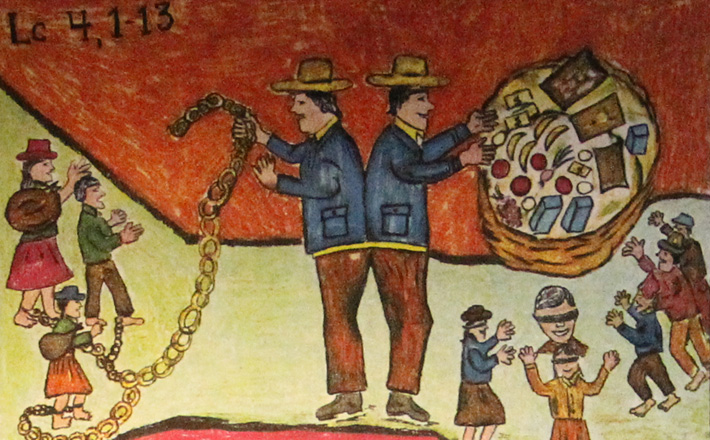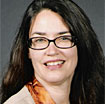Commentary on Deuteronomy 26:1-11
The offering of first fruits in thankful celebration of God’s good gift of the land to Israel is the surprising topic of this First Reading for the First Sunday in Lent.
After forty years in the wilderness, Moses instructs the Israelites about God’s covenantal way of life and blessing in the Promised Land. As he concludes his core teachings (Deuteronomy 12-26), Moses unexpectedly returns to the earlier topic of pilgrimage festivals (cf., Deuteronomy 16, which describes the three pilgrimage festivals of Passover, Shavuot or Weeks, and Sukkot or Booths).
Deuteronomy 26:1-11 presents a theological interpretation of the summer harvest, during which choice agricultural produce was brought to the temple in Jerusalem. This offering from the bounty provided by God through the gift of the land was associated with the pilgrimage festival known as Shavuot or Weeks, held seven weeks after Passover (hence the Greek name Pentecost, for “fifty” days after Passover).
As a people recently enslaved in a foreign land who had since spent a nomadic generation in the wilderness, the Israelites were presented with good news in the form of a commandment emphasizing the abundance of a “land flowing with milk and honey” (26:9) that God was giving them as an “inheritance to possess” (26:1).
Offerings of grain and fruit grown in the very soil of that land would confirm the fulfillment of God’s promise to Abraham (Genesis 12: 7; 15:18-21; 17:8). Israelite worshippers were to emphasize God’s gift of the land by affirming, “Today I declare to the LORD your God that I have come into the land that the LORD swore to our ancestors to give us” (26:3), and “[God] brought us into this place and gave us this land, a land flowing with milk and honey. So now I bring the first of the fruit of the ground that you, O LORD, have given me” (26:10).
According to Jewish tradition, first fruit offerings were made of seven species native to the land: wheat, barley, grapes, figs, pomegranates, olives, and dates (Mishna Bikkurim 1.3). This specificity may encourage us to locate ourselves within our own particular contexts today, giving thanks and offering what we have been uniquely given by God for the prospering of our neighbors and the larger community.
While all of us depend on agriculture for sustenance, fewer and fewer people in the United States and elsewhere in today’s world live on farms or are involved in working the soil. Reflecting on this passage in more contemporary terms, what might be examples of the “first fruits” that we offer to God, our families, and the congregation or community, out of grateful recognition that everything promoting life, health, and peace has been given to us by God?
Annual pilgrimage to Jerusalem, the place that God will choose for the indwelling of the divine name (26:2; cf., Deuteronomy 12), idealizes a type of joyful communal journey for Israelites settled in the Promised Land. This ritual gathering for celebration contrasts with other more difficult biblical sojourns, including the wilderness wanderings of the Israelites whom Moses addresses in this passage.
Even after the Israelites are settled in their own land, they are called to remember past journeys, when they were vulnerable itinerants or “aliens” (26:5) living in foreign lands. The summary of Israelite history in the liturgy recited with the offering (26:5-10) highlights travels undertaken in crisis. The reference to a “wandering Aramean” (26:5) recalls the Israelites’ ancestor Jacob, also known by the name Israel, who fled from his brother Esau’s enmity to live with relatives in Aram and who later emigrated with his family to Egypt to survive a famine.
Also highlighted in this liturgy are the exodus out of Egypt and the entrance into the land (26:9), journeys depicted elsewhere in scripture as challenging and dangerous times. The communal memory in this recitation, however, focuses on God’s responsiveness to the Israelites’ cries for protection and on God’s amazing power to deliver from oppression and to provide for a future filled with hope and abundance.
We might lift up difficult journeys remembered by individuals, families, and the larger community, as times when God preserved them through trial and brought them to a new place from which they might enjoy and share what they have richly received.
The offering of first fruits, whether at the temple in Jerusalem as in this passage or locally in the outlying towns every third year as a tithe (26:12-15; cf., 14:28-29), ensures that the entire community shares in the land’s abundance. Israelite landowners and their families are instructed to partake of the harvest together with “the Levites and the aliens who reside among you” (26:11). The Levites, generally equated with the priests in Deuteronomy, were a tribe not allotted a territory of their own but were rather supported in their religious service through such offerings (12:12). The second group mentioned, the “aliens,” were foreigners who lived among the Israelites without owning land.
Enjoyment of God’s sustenance was to be extended even farther to others listed in the longer description of participants in the festival of Shavuot or Weeks in Deuteronomy 16:11: “Rejoice before the LORD your God — you and your sons and your daughters, your male and female slaves, the Levites resident in your towns, as well as the strangers, the orphans, and widows who are among you” (cf., Deuteronomy 26:12-13). The reason for inclusion of the entire community is again stated clearly in Deuteronomy 16:12: “Remember that you were a slave in Egypt.”
The memory of being landless and vulnerable, preserved here as well as in the longer liturgical recitation in Deuteronomy 26:5-10, cultivates an ethic of empathy as the basis for including those currently landless and vulnerable. God’s inclusive generosity embraces us all, to be experienced again and again as together we share bread, wine, food, and everything else that supports and enhances life.


February 17, 2013